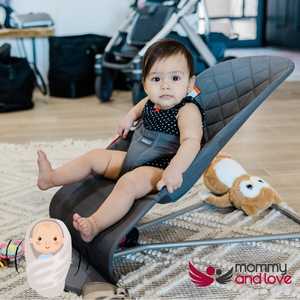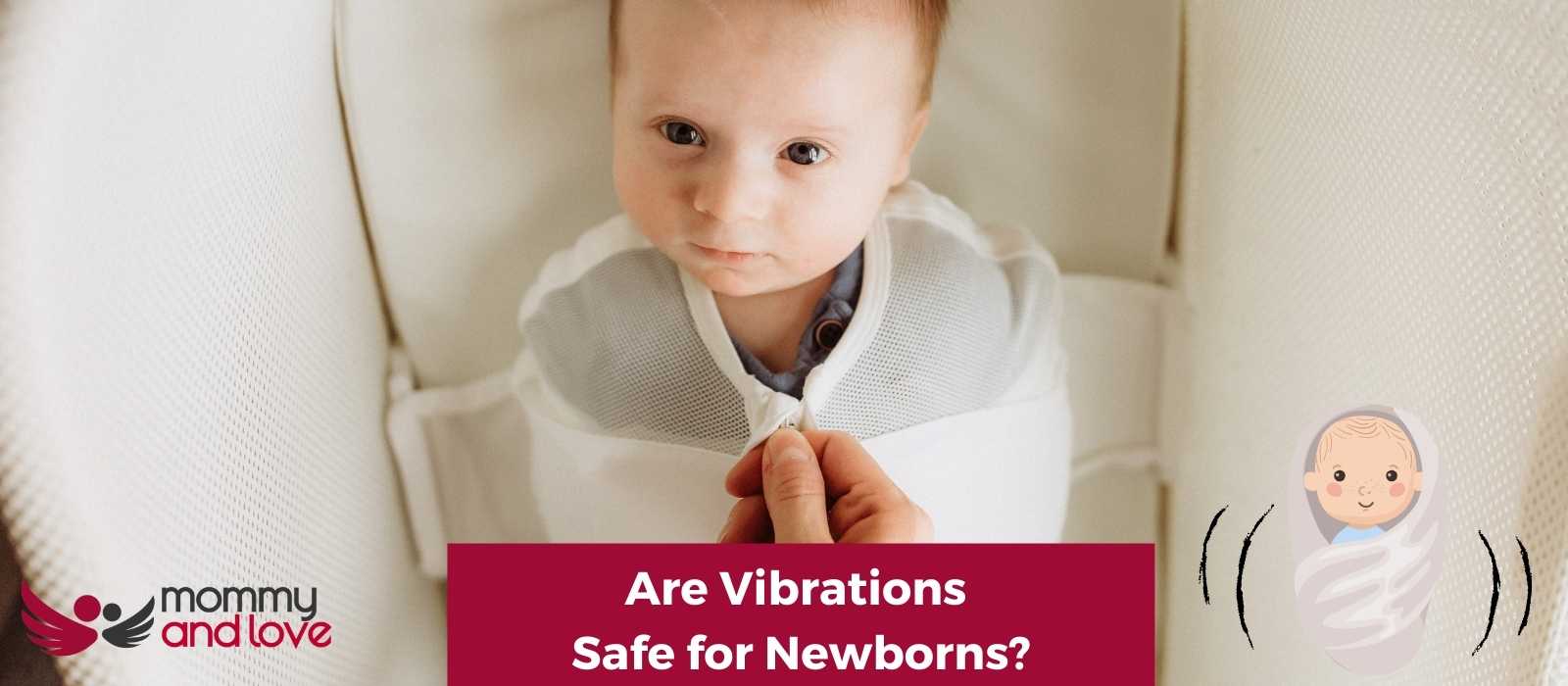In light of all the new technology that surrounds us, this question is becoming more relevant as us parents try to do the best for our babies. Cell phones, laptops, and other electronic devices give off vibrations, and its vital to know if these vibrations are harmful to their babies.
Vibrations are generally safe for babies, however, there is still some risk involved. It’s important to be aware of these risks and take steps to mitigate them as much as possible, only use age or weight-appropriate products and don’t leave babies sitting in vibrating chairs for extended periods.
Affiliate Disclaimer: As an Affiliate, we earn from qualifying purchases.
Is Vibration Safe for Babies?
All existing research indicates that vibrations are entirely safe for newborns, as long as the products you have meet the strict standards set by the JPMA, you should be fine. This is reassuring news, as vibrating bassinets and mats can be helpful tools to soothe infants.
In fact, research by Harvard, proved that preterm babies who slept on vibrating mattresses had their apnea events (slowed heart rate), reduced by 50%!
There are many products on the market that emit vibrations, and parents can rest assured that these products are safe for their children. They also help children feel relaxed and can even promote better sleep, however, babies can get used to them and need them as a crutch to sleep so try not to overly rely on them.
What Are the Effects of Vibrations on Babies?
Babies tend to become fussy and cranky before going to bed. Vibration has been found to be an effective way to induce sleep, as it replicates the calming effects of being in the womb. This is why rocking and swaddling are so popular methods of getting young children to relax and fall asleep.
In many cultures worldwide, rocking babies to sleep in arms or swings is the standard practice and has been for hundreds of years.
However, too much sitting in the same position in a vibrating chair can be harmful. Studies have shown that excessive exposure to vibrations can lead to developmental delays and problems with motor skills. So it’s important to find a balance when using vibrating products.
Here are some tips:
- Use vibrating products sparingly and only when necessary, such as when your baby is having difficulty falling asleep.
- Put your child in a comfortable position.
- Avoid using vibrating products for extended periods of time.
- Keep the volume low when using vibrating products.
- Avoid vibrating young children while they sleep.
- Choose age-appropriate products that are specifically designed for young children such as bassinets with two vibration speeds. Added security features such as Bluetooth-enabled or long-press help prevent unintentional activation which can lead to many injuries in severe cases.
Why Do Babies Like Vibrations?
Infants definitely love vibrations because they make them feel good. The vibrations can make them feel calm and happy. It can also help to soothe them and make them feel more comfortable.
The vibrations can also help to stimulate their brains and help them to develop new skills. It can also help to improve their coordination and balance.
- As your baby experiences vibrations as if she is being rocked, it helps her to feel calm and soothed.
- The vibration of a car ride can be very comforting to infants and can help to lull them to sleep.
- They can help to stimulate the development of babies’ brains.
- In some cases, a vibration can help deal with sleep apnea which is caused by a baby’s inability to regulate sleep well.
- They can help little children to feel relaxed and can be a form of sensory stimulation for them.
- Young children may also enjoy the feeling of being massaged with a vibrating toy.
- They will associate the vibration with sleeping which is a secondary benefit.
Is a Vibrating Bassinet Safe for a Baby?
So, are vibrating bassinets safe? Yes. A vibrating bassinet is a type of baby bed that uses vibration to soothe and calm a baby.
Some people find that these bassinets are helpful in getting their baby to sleep, while others are concerned about the safety of using a vibrating bassinet.
We love the Halo Bassinest which has a 360 swivel, soothing sounds and gentle vibrations.
Vibrating bassinets:
- Help to soothe and calm the baby.
- A baby sleeps longer.
- Provide a gentle and rhythmic movement that can help to lull the baby to sleep.
- Help to relieve colic and gas.
All in all, vibrating bassinets are a safe way to calm and soothe your baby. If you are considering purchasing one for your little one, make sure to do your research and find one that is high quality and has safety features like a low-vibration mode and retractable clips.
Other baby products that may include a vibrate feature:
- portable vibrating soothers
- vibrating bouncer seats
- bouncy seats
- vibrating mat
- vibrating pad
- vibrating seat
What Are the Pros and Cons of Vibrating Bassinets?
If you are considering using a vibrating bassinet for your children, it is important to weigh the pros and cons before making a decision.
Vibrating bassinets can have some benefits, such as helping to soothe and calm a baby, and might be just the thing you need. But there are also some potential drawbacks to consider.
Pros
- Gentle vibrations can help soothe and calm a crying baby.
- Many people believe that vibrating bassinets help prevent Flat Head Syndrome.
- Most children love the vibrations which can help them fall asleep.
Cons
- Some children may find the vibration too strong so make sure you choose products with variable vibrations.
- Cost – A vibrating bassinet can be more expensive than the usual bassinet.
- Some children might get used to the vibrations that they won’t be able to sleep without them.
Should Babies Be Placed in a Vibrating Electric Crib?

This really is up to you. You may feel that it is a helpful way to soothe their children, while others may worry about the potential risks associated with using electrical devices near infants.
There is no clear evidence that using a vibrating crib is harmful to children, but you should be aware of the possible risks before making a decision.
Additionally, vibrations affect children in different ways. Small vibrations might be tolerable to some children, but the same agent might affect other children differently.
If you are considering using a vibrating electric crib, be sure to speak with your child’s healthcare provider to get their opinion and advice.
Can a Baby Sleep in a Vibrating Bouncer?

NO! Babies should never sleep in a bouncer
A study in Pediatrics showed that 3% of all infant sleep related deaths were down to babies sitting in sitting devices like bouncers or cart seats.
Babies should not be left in these long term and should not sleep in them. Read our complete guide to baby sleep safety here.
If you decide to use a vibrating bouncer or bouncy seat for your baby, there are a few things you should keep in mind.
- Make sure that the bouncer is on a level surface.
- Never leave your child unattended in the bouncer.
- Only use the bouncer for short periods of time (15-20 minutes).
- Never let the baby sleep in a boucher
If you follow these guidelines, using a vibrating bouncer or a bouncy seat can be a safe and effective way to calm a baby.
Should Babies Be Vibrated While They Sleep?
There are different ways to help babies sleep easier, such as swaddling, back-patting, soft light, soothing sounds, or white noise. You should keep the environment before bed quiet and have a fixed sleep time. These techniques can help babies sleep better and provide them with the reassurance, quietness, and comfort they need.
Some parents may choose to vibrate their baby gently while he or she falls asleep, as a way of making them more comfortable. It is important to be careful with the intensity of the vibration in order not to endanger the baby.
Babies are often judged on their abilities to lift their heads, as this is a common test of development. While the baby’s brain develops rapidly during this stage, the baby’s skeletons – including the skull bone – have not fully developed during this stage, they are vulnerable to vibrations.
Sure, vibrating children can have their own benefits such as helping them fall asleep but using them is not without risks.
Conclusion
So, is vibration bad for infants? No. But although vibrations are generally safe for newborn babies according to new research data, there is still some risk involved. It’s important to be aware of these risks and take steps to mitigate them as much as possible.
If you do decide to use vibration products with your child, always follow the manufacturer’s instructions and make sure that you are using a product that conforms to current safety standards.
Baby Vibrations Safety FAQs
What Is Shaken Baby Syndrome?
Shaken baby syndrome (SBS) is a preventable, serious brain injury that can result from forcefully shaking an infant or toddler. It is also referred to as abusive head trauma, shaken impact syndrome, inflicted head injury, or whiplash shaken infant syndrome.
SBS is a leading cause of child abuse deaths in the United States and often results in lifelong disabilities for survivors.
SBS occurs when a toddler or baby’s head is forcefully shaken. The child’s brain bounces back and forth inside the skull, causing bruising, vision loss, bleeding, and swelling to the brain tissue. This can lead to permanent brain damage and even death.
SBS can also happen accidentally. For instance, when a child is playing he might accidentally rock his head hard because his head is heavier than the rest of his body’s weight.
What Are the Consequences of Rocking the Baby Too Hard?
Parents need to be careful when rocking their newborns, as it can have serious consequences if done too hard. This is especially true if the child’s head hits a surface such as a wall, floor, or bed.
Rocking a baby too hard can have a number of consequences, both short-term and long-term.
Short Term
- The baby may become agitated and cry. This is because the rocking motion can be overstimulating for the fussy baby.
Long Term
- The baby’s development may be hindered if they are rocked too hard. This is because the rocking motion can interfere with the baby’s natural movement, which is necessary for their development.
- The child may suffer from a neurological disorder, such as cerebral palsy if they are rocked too hard.
- It might also cause permanent nerve damage, cerebral edema, and mental retardation.
- The baby’s muscles may not develop properly if they are constantly being restrained by the rocking motion.
- The baby
- The baby may have difficulty bonding with others if they are unable to experience the full range of emotions and sensations.
- The baby may suffer from shaken baby syndrome or SBS.
There are a number of potential consequences that can occur if a baby is rocked too hard, and some of them can be serious. As a parent, it is important to be aware of these potential consequences so that you can take action if necessary.

This article was written by: Gian MIller – Full-Time Writer, Baby Whisperer & Dad of 3.
Gian spends a lot of his time writing. A self-proclaimed baby whisperer, Gian has been through it all with his own children and is passionate about sharing his hard-won wisdom with other parents. When he’s not writing or changing diapers, you can find him playing the guitar or watching baseball (or preferably both at the same time).





